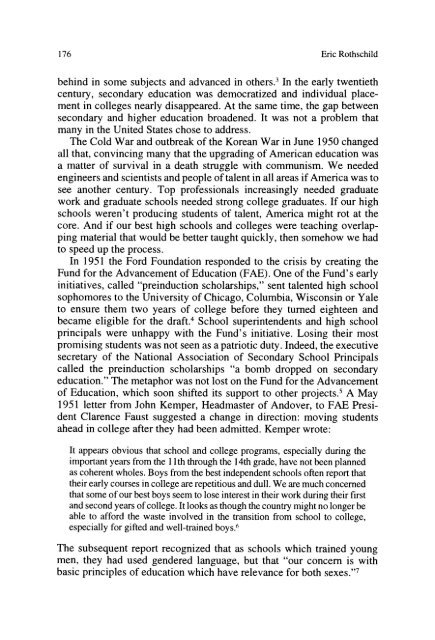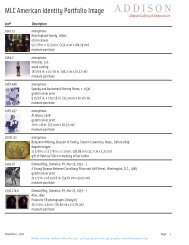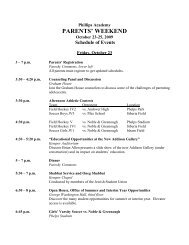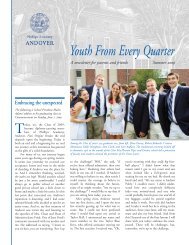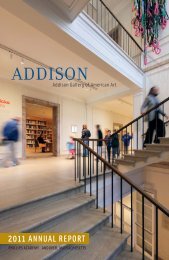Four Decades of the Advanced Placement Program
Four Decades of the Advanced Placement Program
Four Decades of the Advanced Placement Program
You also want an ePaper? Increase the reach of your titles
YUMPU automatically turns print PDFs into web optimized ePapers that Google loves.
176 Eric Rothschild<br />
behind in some subjects and advanced in o<strong>the</strong>rs.3 In <strong>the</strong> early twentieth<br />
century, secondary education was democratized and individual placement<br />
in colleges nearly disappeared. At <strong>the</strong> same time, <strong>the</strong> gap between<br />
secondary and higher education broadened. It was not a problem that<br />
many in <strong>the</strong> United States chose to address.<br />
The Cold War and outbreak <strong>of</strong> <strong>the</strong> Korean War in June 1950 changed<br />
all that, convincing many that <strong>the</strong> upgrading <strong>of</strong> American education was<br />
a matter <strong>of</strong> survival in a death struggle with communism. We needed<br />
engineers and scientists and people <strong>of</strong> talent in all areas if America was to<br />
see ano<strong>the</strong>r century. Top pr<strong>of</strong>essionals increasingly needed graduate<br />
work and graduate schools needed strong college graduates. If our high<br />
schools weren't producing students <strong>of</strong> talent, America might rot at <strong>the</strong><br />
core. And if our best high schools and colleges were teaching overlapping<br />
material that would be better taught quickly, <strong>the</strong>n somehow we had<br />
to speed up <strong>the</strong> process.<br />
In 1951 <strong>the</strong> Ford Foundation responded to <strong>the</strong> crisis by creating <strong>the</strong><br />
Fund for <strong>the</strong> Advancement <strong>of</strong> Education (FAE). One <strong>of</strong> <strong>the</strong> Fund's early<br />
initiatives, called "preinduction scholarships," sent talented high school<br />
sophomores to <strong>the</strong> University <strong>of</strong> Chicago, Columbia, Wisconsin or Yale<br />
to ensure <strong>the</strong>m two years <strong>of</strong> college before <strong>the</strong>y turned eighteen and<br />
became eligible for <strong>the</strong> draft.4 School superintendents and high school<br />
principals were unhappy with <strong>the</strong> Fund's initiative. Losing <strong>the</strong>ir most<br />
promising students was not seen as a patriotic duty. Indeed, <strong>the</strong> executive<br />
secretary <strong>of</strong> <strong>the</strong> National Association <strong>of</strong> Secondary School Principals<br />
called <strong>the</strong> preinduction scholarships "a bomb dropped on secondary<br />
education." The metaphor was not lost on <strong>the</strong> Fund for <strong>the</strong> Advancement<br />
<strong>of</strong> Education, which soon shifted its support to o<strong>the</strong>r projects.5 A May<br />
1951 letter from John Kemper, Headmaster <strong>of</strong> Andover, to FAE President<br />
Clarence Faust suggested a change in direction: moving students<br />
ahead in college after <strong>the</strong>y had been admitted. Kemper wrote:<br />
It appears obvious that school and college programs, especially during <strong>the</strong><br />
important years from <strong>the</strong> 11 th through <strong>the</strong> 14th grade, have not been planned<br />
as coherent wholes. Boys from <strong>the</strong> best independent schools <strong>of</strong>ten report that<br />
<strong>the</strong>ir early courses in college are repetitious and dull. We are much concerned<br />
that some <strong>of</strong> our best boys seem to lose interest in <strong>the</strong>ir work during <strong>the</strong>ir first<br />
and second years <strong>of</strong> college. It looks as though <strong>the</strong> country might no longer be<br />
able to afford <strong>the</strong> waste involved in <strong>the</strong> transition from school to college,<br />
especially for gifted and well-trained boys.6<br />
The subsequent report recognized that as schools which trained young<br />
men, <strong>the</strong>y had used gendered language, but that "our concern is with<br />
basic principles <strong>of</strong> education which have relevance for both sexes."7


